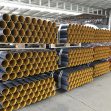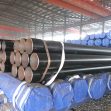Production control is important in the current steel market
In the face of numerous challenges and uncertainties, production control has emerged as a critical strategy to address difficult problems in the current steel market. The steel industry is highly complex, influenced by factors such as market demand, raw material costs, supply chain disruptions, and global trade dynamics. By implementing effective production control measures of black iron steel pipe, steel enterprises can enhance operational efficiency, optimize resource utilization, and navigate the complexities of the market.
One of the primary difficulties faced by steel enterprises is the volatility of market demand. Fluctuations in demand can lead to imbalances in supply and impact steel prices. By implementing production control techniques, such as demand forecasting and production planning, steel enterprises can align their production levels with market demand. Accurate demand forecasting allows for better inventory management, minimizing the risk of excess inventory or stockouts. This enables steel pipe suppliers to optimize their production schedules and respond promptly to changing market conditions.

Another challenge in the current steel market is the fluctuation of raw material costs. Steel production relies heavily on inputs such as iron ore, coking coal, and scrap metal, the prices of which can be volatile. Effective production control involves monitoring and managing raw material costs through strategic sourcing, inventory management, and hedging strategies. By closely monitoring market trends, negotiating favorable contracts, and diversifying suppliers, steel enterprises can mitigate the impact of raw material price fluctuations on their production costs. Supply chain disruptions, including transportation delays, trade restrictions, and logistical challenges, are also difficult problems faced by the steel industry. Effective production control involves building resilient supply chains and implementing contingency plans. By maintaining strong relationships with suppliers, optimizing transportation routes, and strategically locating warehouses, steel enterprises can minimize disruptions and ensure a steady flow of raw materials to their production facilities. This enables them to meet customer demands of square steel pipe in a timely manner, enhancing customer satisfaction and loyalty.
Furthermore, production control plays a crucial role in cost optimization and efficiency improvement. By implementing lean manufacturing principles, process optimization, and continuous improvement initiatives, steel enterprises can streamline their production processes and eliminate waste. This leads to cost savings, improved productivity, and enhanced competitiveness in the market. Production control techniques such as Six Sigma and Kaizen can help identify bottlenecks, reduce cycle times, and improve overall operational efficiency.
Moreover, production control enables steel enterprises to meet quality standards and comply with environmental regulations. By implementing robust quality control measures throughout the production process of metal pipe, steel enterprises can ensure that their products meet customer specifications and regulatory requirements. This not only enhances customer satisfaction but also builds a reputation for reliability and compliance.
Tel: +86 18202256900 Email: steel@fwssteel.com










